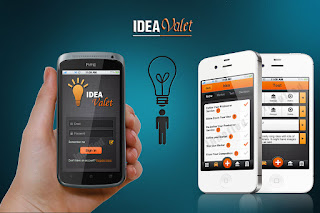Mobile App Idea
Let’s suppose you have a scintillating mobile app idea that’s burning a hole in your brain. You think you’re ready to share it with an app developer who can bring it to reality. But then you get this dark feeling: “What if somebody steals my idea?”
That’s the signal to start perspiring—in a good way.
It was light years ago, 1902 actually, when Thomas Alva Edison told us, “Genius is one percent inspiration and 99 percent perspiration.” Today you don’t have to be a genius to have an inspiring mobile app idea, but you still need that chunk of sweat equity to make a brilliant mobile app light up on millions of mobile devices. Some of that upfront investment in sweat equity involves protecting your mobile app idea.
Non-Disclosure Agreements and Intellectual Property Lawyers—Oh My!
Nothing works up a good sweat like the thought of hiring a lawyer. But you don’t necessarily have to hire a high-priced attorney specializing in intellectual property to understand and use a Non-Disclosure Agreement. That said, if you want to do everything possible to protect your idea, and you have the money, then hire an attorney. Nothing you can do on your own can provide that level of protection.
But many people in the tech world feel adequately comfortable using NDAs without getting all lawyered-up. In fact, responsible mobile app developers are very familiar with NDAs and may offer their clients a standard NDA as a general business practice.
A reputable developer will understand your concern about losing your idea. However, according toappmuse.com, “experienced mobile app developers tend to be a bit jaded when people tell them they have the next billion-dollar app idea.”
You may need to reassure the developer that you are a serious client, with the money and commitment to follow through. Maybe you could start by giving the developer a broad sketch of your app idea, just enough information for preliminary discussion. Also, understand that it’s not in the developer’s best interest to sign an NDA for every prospective project.
But beware: If a developer ultimately refuses to sign an NDA, step away and find someone who will.
What is an NDA?
Simply put, a non-disclosure agreement is a contract to keep a secret. A non-disclosure agreement is often used when two companies want to meet to discuss a joint opportunity involving the exchange of confidential information. In the context of someone wanting to hire a mobile app developer, an NDA would be an agreement between the person with the mobile app idea and the programmers who could bring that idea to life. The idea person would disclose the idea to the programmer in order to negotiate a contract for programming of the mobile app and the programmer would agree to keep the idea confidential. http://appmuse.com/appmusing/what-is-a-non-disclosure-agreement/
A typical Non-Disclosure Agreement covers the following basic points:
- Names the parties
- Outlines the confidential information
- Lists conditions that would be legal exceptions to the agreement
- Spells out the obligations of the party bound to secrecy
- Dictates the term of confidentiality in years
- Covers miscellaneous or “boilerplate” points
An NDA is no guarantee that your idea is 100% Safe
An NDA at best provides a level of protection. Most important, it must be signed by both parties to be binding. Don’t forget to sign the NDA yourself once the developer has signed it.
Understand that breach of contract is difficult and expensive to prove. But take heart in this fact: it’s much more likely for an idea to get ripped off once it is out on the market than during the development process.
There are many online resources offering Non-Disclosure Agreement information and templates. You could start your research with Eugene R. Quinn, Jr., US patent attorney and president of IPWatchdog, Inc. or try www.lawdepot.com.
Putting in More Sweat Equity
Here are some additional suggestions for working up a sweat to protect your mobile app idea: http://www.bianor.com/blog/how-to-protect-mobile-app-idea/
- Hire a Reputable Development Company
Find a good, well established and responsible mobile software development company, such as Bianor. Review their website, previous projects, client feedback. Talk to their clients. Reputable professional services companies build their business on integrity simply because there’s no other sustainable way. - Ensure Ownership of the Product
Go over the mobile application development company’s contract and ensure IP rights are granted to you as the sole owner of the final product. Ask the developer about any third-party products and/or software libraries incorporated into the product, and make sure to check their licensing agreements. - Control the Distribution
Make sure you upload your app to the various app stores from your own account, rather than let the development company do it from theirs. Register for an account in your name, give them temporary access and change access rights later. - Leave Some Functionality Out
If your app is good, expect knock-offs. Leave some unique functionality out of the first version and launch new features distinguishing your app from the clones. If you roll out new features and functionalities relatively often, your chances of staying ahead of the competition increase.
Still have that burning inspiration to develop your brilliant mobile app idea? Go for it! You’re not afraid of a little sweat!
And if your inspired app led to you getting burned, let us know. If you’ve been pirated, cloned, or otherwise dis-app-ointed, we’d like to hear your story.
.png)






0 comments :